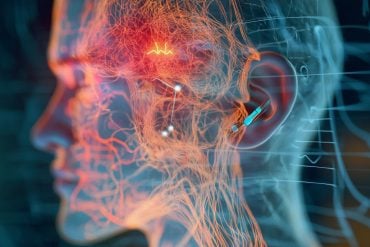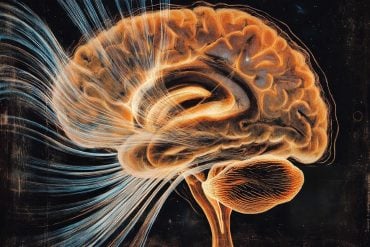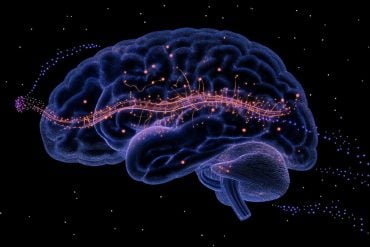Summary: When pregnant women consume diets high in polyunsaturated omega-6 fatty acids, an excess of endocannabinoids is produced which overloads the fetus, and impairs healthy brain development.
Source: Medical University of Vienna
A study team at MedUni Vienna’s Center for Brain Research has found that high-fat maternal diets can cause life-long changes in the brain of the unborn offspring. When a pregnant woman consumes a diet high in polyunsaturated omega-6 fatty acids, her body produces an excess of endogenous cannabinoids (endocannabinoids), which overload the fetal organism and impair the development of healthy brain networks. Such a mechanism seems relevant to pathologies such as ADHD, schizophrenia and anxiety disorders. It is unlikely that such damage can simply be reversed by a subsequent change of diet.
The study, which has been published in the journal ‘Molecular Psychiatry’, examined in cell- and mouse models, how intake of high-fat diets throughout pregnancy (rich in polyunsaturated omega-6 fatty acids) impacts fetal brain development. When the mother consumes a high-fat diet during pregnancy, both mother and child produce an excess of endocannabinoids, which can even be transferred from the mother to the fetus. Endocannabinoids can then overload the corresponding cannabinoid receptors in the fetal brain and limit their ability to signal. As a result, nerve cells will no longer be able to correctly integrate into the brain to fulfil their prospective functions. The study also shows that these impairments persist throughout life of the affected offspring and can serve as critical triggers to developing psychiatric disorders later in life.
Endocannabinoids are substances produced by the body itself. They are part of the endocannabinoid system, which serves as a fundamental communication system in the brain as well as other organs. In the adult brain, endocannabinoids limit communication (‘chemical neurotransmission’) between neurons by binding to cannabinoid receptors. In the developing brain, endocannabinoids determine when and where neurons are positioned and if they form connections with each other. This means that any substance that influences either endocannabinoid levels or directly affects cannabinoid receptor function will inevitably impinge upon brain development.
“By acting like a ‘stop signal’, a prolonged overload of endocannabinoids impairs the developmental program of many neurons in the fetal brain,” explains principal investigator Tibor Harkany, Head of the Department of Molecular Neurobiology at MedUni Vienna’s Center for Brain Research. “Persistently muting cannabinoid receptors, we believe, alters the epigenetic programs of affected nerve cells. Epigenetic mechanisms determine the pattern of gene expression in any cell. If damaged, the cells are no longer able to carry out their functions adequately. This will limit their ability to adapt their proper shape or select communication partners because of a shortage of proteins required as cellular building blocks or signalling molecules.”
On a large scale, an inhibition to the creation of connections between brain cells will impair the formation of important neuronal networks, the functional building blocks of the brain. This can result in psychiatric disorders such as ADHD, schizophrenia and anxiety disorders.

Damage is likely irreversible
“As far as we can tell, the pathological changes of nerve cells we have found are irreversible,” explains Harkany. “It is of limited use to changing to a healthy, low-fat diet after birth when the damage has already been done.” Although the study is based on animal models, Harkany stresses that other studies already indicate harmful effects in humans, while this report identifies the very molecular mechanisms that can also apply to humans.
Is treatment still possible?
“In order to find effective treatments, we will need active agents that directly intervene in the epigenetic regulation of gene expression,” explains lead author Valentina Cinquina. “We have not yet trialed any such drugs but it is an exciting prospect to work on such interventions, which can perhaps be used safely and effectively in the future.” For example, so-called histone deacytylase Inhibitors (HDACs) are extensively tested for their treatment potential in Alzheimer’s disease and various cancers.
Source:
Medical University of Vienna
Media Contacts:
Tibor Harkany – Medical University of Vienna
Image Source:
The image is in the public domain.
Original Research: Closed access
“Life-long epigenetic programming of cortical architecture by maternal ‘Western’ diet during pregnancy”. Valentina Cinquina, Daniela Calvigioni, Matthias Farlik, Florian Halbritter, Victoria Gernedl, Sally L. Shirran, Matthew A. Fuszard, Catherine H. Botting, Patrick Poullet, Fabiana Piscitelli, Zoltán Máté, Gábor Szabó, Yuchio Yanagawa, Siegfried Kasper, Vincenzo Di Marzo, Ken Mackie, Chris J. McBain, Christoph Bock, Erik Keimpema, Tibor Harkany.
Molecular Psychiatry doi:10.1038/s41380-019-0580-4.
Abstract
Life-long epigenetic programming of cortical architecture by maternal ‘Western’ diet during pregnancy
The evolution of human diets led to preferences toward polyunsaturated fatty acid (PUFA) content with ‘Western’ diets enriched in ω-6 PUFAs. Mounting evidence points to ω-6 PUFA excess limiting metabolic and cognitive processes that define longevity in humans. When chosen during pregnancy, ω-6 PUFA-enriched ‘Western’ diets can reprogram maternal bodily metabolism with maternal nutrient supply precipitating the body-wide imprinting of molecular and cellular adaptations at the level of long-range intercellular signaling networks in the unborn fetus. Even though unfavorable neurological outcomes are amongst the most common complications of intrauterine ω-6 PUFA excess, cellular underpinnings of life-long modifications to brain architecture remain unknown. Here, we show that nutritional ω-6 PUFA-derived endocannabinoids desensitize CB1 cannabinoid receptors, thus inducing epigenetic repression of transcriptional regulatory networks controlling neuronal differentiation. We found that cortical neurons lose their positional identity and axonal selectivity when mouse fetuses are exposed to excess ω-6 PUFAs in utero. Conversion of ω-6 PUFAs into endocannabinoids disrupted the temporal precision of signaling at neuronal CB1 cannabinoid receptors, chiefly deregulating Stat3-dependent transcriptional cascades otherwise required to execute neuronal differentiation programs. Global proteomics identified the immunoglobulin family of cell adhesion molecules (IgCAMs) as direct substrates, with DNA methylation and chromatin accessibility profiling uncovering epigenetic reprogramming at >1400 sites in neurons after prolonged cannabinoid exposure. We found anxiety and depression-like behavioral traits to manifest in adult offspring, which is consistent with genetic models of reduced IgCAM expression, to suggest causality for cortical wiring defects. Overall, our data uncover a regulatory mechanism whose disruption by maternal food choices could limit an offspring’s brain function for life.






